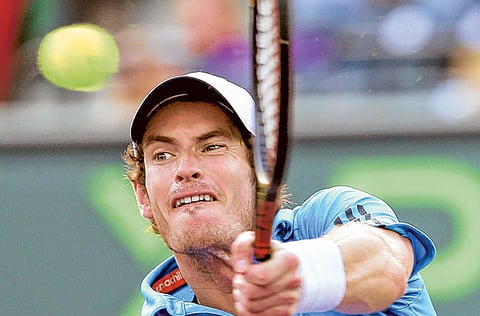Andy Murray faces crossroads after Ivan Lendl
Struggling Wimbledon champion has major decisions to make over new coach

Key Biscayne, Florida: For Andy Murray, a major change was not immediately visible on the surface.
Though his coach, Ivan Lendl, was in his usual seat in Murray’s player’s box Sunday, their partnership is over by mutual consent, despite their numerous triumphs together.
Murray said that he did not want to rush into a panic hire, but that he hoped to have a new full-time coach in place before the French Open in May.
Lendl and Murray began working together at the beginning of 2012, and over a 12-month stretch, Murray made his first appearance in a Wimbledon final and won an Olympic gold medal, his first Grand Slam title at the 2012 US Open, and, most crucially, a Wimbledon title last July that ended a 77-year drought for British men.
The months since that moment of glory have been tougher, however, with a quarterfinal exit at the US Open in September followed by back surgery that kept Murray out for the rest of the year. Still recuperating, he lost in the quarterfinals of the Australian Open in January. He has not won a match against a top-20 player since winning Wimbledon.
Murray’s ranking has slipped to No. 6, his lowest since 2008. If he does not reach the final here this week at the Sony Open, where he is the defending champion, he will slip to No. 8.
“The best thing to do was just to move on,” Murray said last week of his parting with Lendl. “You know, it’s a tough one for me, because he’s been a big part of my life. He’s been a big part of my team. He made a huge difference to my tennis.”
In Murray’s announcement, Lendl said, “Having helped him achieve his goal of winning major titles, I feel like it is time for me to concentrate on some of my own projects moving forward, including playing more events around the world, which I am really enjoying.”
Murray said the biggest help Lendl had provided, more than any technical or tactical advice, concerned the mental side of the game and how to win on the biggest stages.
“I would hope that I’ve learned enough from him and a way to approach those matches and how to deal with those situations better,” Murray said. “Because I have won those matches, so I know how to deal with it better now.”
In the short term, however, Murray acknowledged that the change had been a distraction.
“When you have a settled team and stuff, that’s the best,” he said. “But everyone goes through periods like this.”
“I would imagine I would stay in touch with him,” added Murray, who said he maintained a “great relationship” with each of his former coaches.
One former coach with whom Murray has stayed in touch is Darren Cahill, an Australian television analyst and a former coach of Andre Agassi and Lleyton Hewitt. Cahill worked directly with Murray for several months in 2011 as he strived to compete with Novak Djokovic, Rafael Nadal and Roger Federer.
“Winning a major was the big goal, and the big one was always Wimbledon,” Cahill said. “He had something to really focus on and chase after, and every time he stepped on the tennis court, there was a great focus and urgency toward his practice, because he was chasing three of the all-time greats, Novak, Rafa and Roger, and every second that he wasn’t working towards that was a wasted second.”
“He’s still playing good tennis in patches,” Cahill added, “but doesn’t seem to be sustaining it, and I think that seems to be more mental than anything.”
Cahill said he had seen a letdown from his friend Pat Cash after he surprisingly won the Wimbledon title over Lendl in 1987.
“I was with him that night when he was celebrating after beating Ivan in the final,” Cahill said. “And the next day, it’s always stayed with me, he said, ‘Where do we go from here?’
“He said: ‘This is all I’ve ever dreamed about doing, winning the Wimbledon final, holding that trophy on the biggest stage. What do I do now?’ And he kind of carried that for the rest of his career.”
Federer preached patience for Murray.
“Everybody has letdowns at one point,” Federer said. “You might only have them for a week, maybe just an hour, whatever it might be, you know. Some have it for years. It’s just frustrating when you don’t attend that level of play that you know you can.
“But things are still very fresh for him, so I think it would be wrong to question him at this point. In a year’s time, it’s different, you know, if he keeps the results he’s having. But I’m very confident for him that success will return at the big level.”
— New York Times News Service



